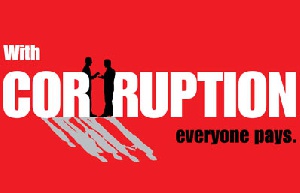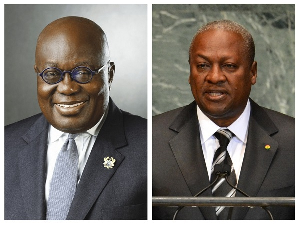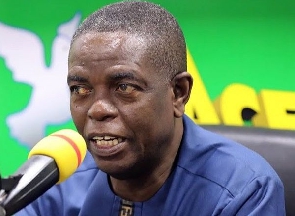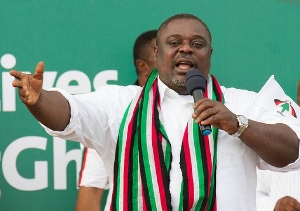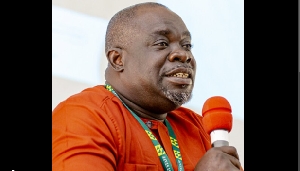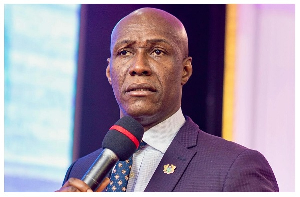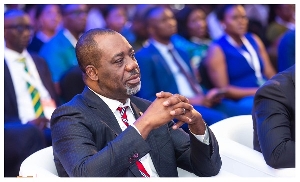President Kufuor?s much touted fight against corruption may be a mere showpiece considering the country?s placement on the corruption index this year.
In the latest reports from the worlds respected Transparency International, the leading international non-governmental organization devoted solely to the fight against corruption worldwide, Ghana is ranked 65th amongst 159 voluntary countries included in the 2005 index, with a score of 3.5 out of a possible 10.
This score represents a drop from last year?s score of 3.6.
It is also exactly the score obtained in 2000- the last year of the National Democratic Congress (NDC) administration and the year of the elections that brought the then opposition New Patriotic Party (NPP) into power in January 2001.
(The 1999 score was 3.3; 2001 was 3.4; 2002 was 3.9; 2003 was 3.3).
The 2005 score thus raises questions about whether the efforts to combat corruption are stagnating or retrogressing considering that it falls far short of Ghana?s best CPI score of 3.9 in 2002.
This time around, neighbouring Nigeria has been cited among countries that have seen some improvements since last year. Nigeria?s score of 1.9, even though rather low is an improvement of last year?s score of 1.6.
The slight improvement is attributed mainly to vigorous pursuit of sanctions by the government and the energizing of some of the institutions for combating corruption in the country in recent years.
Chad, which scored 1.7 in both 2004 and 2005, has received the worst score in Africa, and worldwide according to the 2005 CPI.
The country is marked by political instability, human rights abuses and weak press freedom.
Chad is also the location of the world bank funded Chad-Cameroon oil pipeline project, which is attempting to defy ?resource curse? by using oil revenues to reduce poverty. The project depends heavily on the political will of the government to respect the rule of law. While Chad has achieved a degree of transparency not seen in other oil-rich countries, ongoing reports of mismanagement or corruption must be followed by government action.
In 2001, Ghana joined 18 other countries to seek debt relief through the Highly Indebted Poor Country Initiative (HIPC).
According to the GII ?It is instructive to note that Ghana, like all the other HIPC countries scored below 4 in the CPI 2005, and indeed most of them, like Ghana are far from achieving the score of 5, and maximum score of 10, which are taken as the mark for countries that are doing relatively well in tackling corruption and thereby potentially capable of achieving economic growth and development.?
According to the Executive Secretary of Ghana Integrity Initiative, Daniel Batidam, ?This year?s score should therefore remind us that Ghana is far from winning the fight against corruption, which also has implications for poverty reduction.?
More that two thirds of the 159 countries surveyed in the 2005 index scored less than 5, indicating high levels of corruption in a majority of the countries surveyed.
70 countries, nearly half of those included in the index scored less than 3 on the CPI, indicating a severe corruption problem in those countries. Among countries included in the index, corruption is perceived as most rampant in Chad, Bangladesh, Turkmenistan, Myanmar and Haiti, which are also among the poorest countries in the world.
According to Batidam, corruption is a developmental issue, not a moral or political issue, and therefore cannot be solved by mere talks, but rather through practicable mechanisms. This is supported by the statistics, as it is evident that CPI scores of the more developed countries are consistently higher than the African nations.
?We are moralizing the issue too much,? he said, adding, ?politicians should stop talking about each other being corrupt.?
Indications are that countries with a score higher than 9, with very low levels of perceived corruption are predominantly rich countries, namely Iceland, Finland, New Zealand, Denmark, Singapore, Sweden and Switzerland.
Forty-four countries in Africa were included in this years index with Ghana ranking 7th from the top, as in 2004, coming after countries like Botswana, Tunisia, South Africa, Namibia, Mauritius, and Seychelles.
?This means that Ghana has to do more to make itself as attractive, or more attractive to investors as those 6 African countries with better CPI scores? stated Batidam.
Many studies have shown that there is a direct correlation between fighting corruption in the broader sense of achieving good governance and reaping the ?developmental dividend? which includes better living conditions for the citizenry, improved child mortality rates, higher per capita income, and greater literacy among others.
In this vein, The Ghana Integrity Initiative and Transparency International urge governments, especially in low income earning countries, such as Ghana, to increase their political will and expand efforts to fight corruption in order to reap the fruits of democracy and development.
It also called on the Ghanaian government to expedite action on the passage of a credible freedom of information Act to facilitate public access to information about the activities of government including budgetary allocations, revenues and expenditures, and thereby enhance accountability and transparency, and increase trust in government.
Furthermore, GII called for the speedy passage of the whistle-blower legislation, and other transparency enhancing legislation, which will go along way to empower citizens and enable them to hold government accountable.
Again, the need for a review of the public office holder asset decelerating regime, improvements in the parliamentary process to make it more rigorous and effective as a tool of public accountability, speedy elaboration and adoption of the conflict of interest prevention regulations developed by CHRAJ in collaboration with the Ghana Anti-Corruption Coalition and the adoption of an executive employee/presidential appointee code of conduct, and the proper and effective operationalisation of the public procurement legislation Act 663 was recommended.
- I will involve the police to deal with Kusi Boateng’s scandal – Ablakwa
- How GNPC CEO, board members, other officials increased their allowance by 150% - Ablakwa details
- Ofori-Atta's Databank, other bookrunners bagged GH¢875 million in 4 years – Adongo alleges
- Ambulance service sends delegation to cement depot seen in viral video
- Oil revenue management: PIAC demands prosecutorial powers
- Read all related articles

